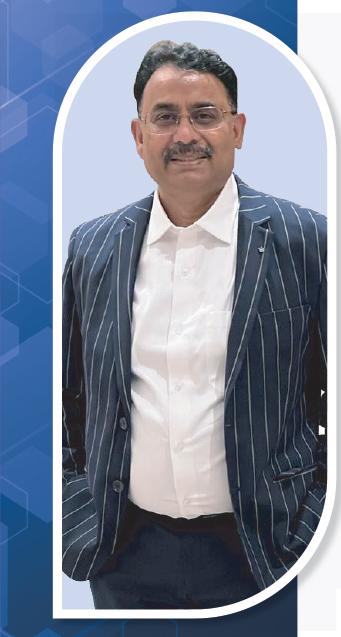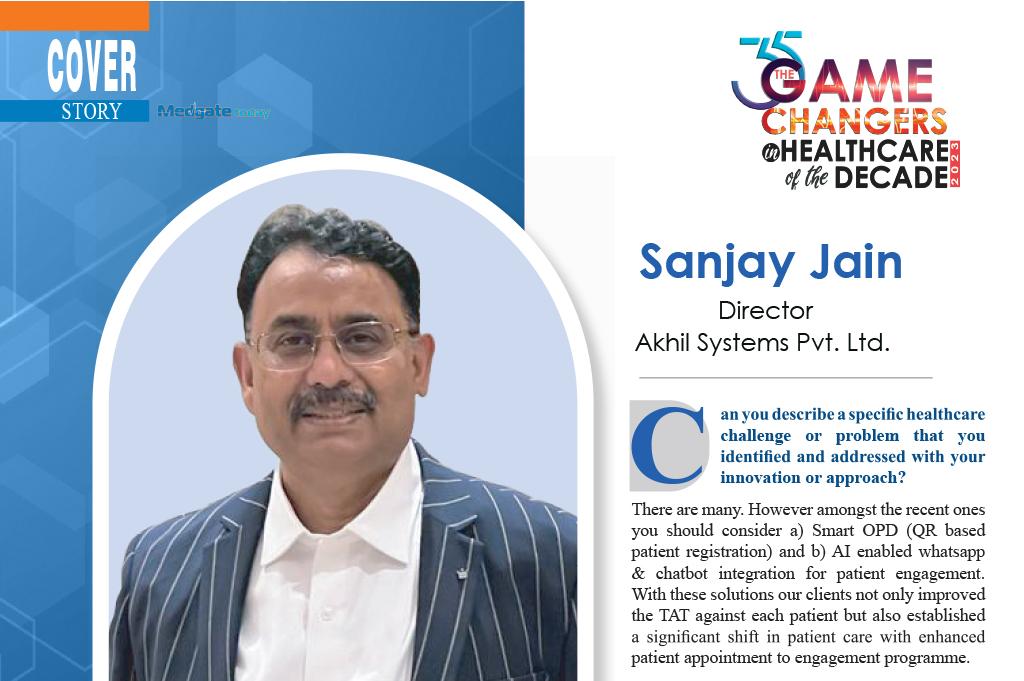
In past 30 years he has been recognized as one of the India’s finest global digital healthcare-IT leaders, pioneer and visionary who happen to have more than 3 decades of experience in hospital digitalization, management consultation and business acceleration. Having dedicated his life in modeling and delivering state-of-the-art IT solutions to hospitals of all sizes and other medical facilities, his skills in enterprise (healthcare) business automation and digitalization are recognized by the leaderships across India, Africa, GCC and APAC.
Can you describe a specific healthcare challenge or problem that you identified and addressed with your innovation or approach?
There are many. However amongst the recent ones you should consider a) Smart OPD (QR based patient registration) and b) AI enabled whatsapp & chatbot integration for patient engagement. With these solutions our clients not only improved the TAT against each patient but also established a significant shift in patient care with enhanced patient appointment to engagement programme.
What was the initial spark or idea that led to your groundbreaking healthcare innovation?
Patients visiting different healthcare facilities have to wait in long queue to get themselves registered in OPD. The scenario has been same across all major facilities and that is when we started pondering over the same and try finding an innovative way to reduce the waiting time and relinquish the crowded lobbies in Hospitals. Our smart OPD (QR based patient registration) is the solution which has been adopted by many health facilities.
In today’s rapidly evolving healthcare scenario, patient engagement is critical. Active patient engagement improves treatment quality, especially in case of chronic diseases. However there has been always a gap in active participation and collaboration between healthcare providers and patients, aiming to ensure that patients are well-informed about their treatment, recovery, medication choices, and other important aspects of their medical care. We realized it as an integral part of health care and a critical component of safe, people-centered services & bridged the gap with our partners integrating Miracle HIS with whatsapp & smart conversational AI.
How did you overcome obstacles and resistance within the healthcare industry when introducing your innovative solutions?
One of the most significant obstacle that we faced initially is the resistance to change from healthcare workers who will be impacted by it. Some other crucial challenges include complex regulatory constraints, outdated technical models and mindsets, interoperability issues, and rapidly changing business models.
Healthcare expenditure in India is predominantly out-of pocket. The huge gap between availability, accessibility and affordability of healthcare services in India provides a big opportunity for socially conscious innovations focused on delivering economically feasible care through frugal technology.
Can you share a success story or case study demonstrating your work’s real-world impact on patients or healthcare systems?
QR codes enabled hospitals to streamline and leverage the patient management system. Hospitals adopting the technology can treat patients better and reduce administrative burden. They can also improve the time efficiency and cost associated with each patient by providing ready and instant information through QR codes. It also reduces the crowd in waiting area and help in smooth correct capturing of demographic data since patient themselves can do the preregistration by a single scan of QR code. The process is effective, fast and doesn’t require caregivers to go through piles of papers just to identify patients. With Miracle HIS integrated with AI based whatsapp & bot takes care of all the engagement touch-points (inbound & outbound) & provide valuable insights via patient conversations that can help healthcare companies provide better care to their patients. Our clients who have adopted this feature got 5-10% increased new bookings, reduced customer care calls by 20 25% & patient satisfaction up to 92%.
How has your innovation or approach improved patient outcomes, reduced healthcare costs, or enhanced the overall quality of care?
QR codes enable hospitals to streamline and leverage the patient management system. It can help hospitals treat patients better and reduce administrative burden. One can also improve the time efficiency and cost associated with each patient by providing ready and instant information through QR codes. WhatsApp has become ubiquitous, with people all over the world using it to communicate with friends and family.
This gave us the thought that the healthcare providers can communicate with their patients using a platform which they are already familiar with. No matter where a clinic or hospital is based, it’s likely that their patients are already using WhatsApp, making it an accessible and convenient tool for all healthcare communication. WhatsApp messages have end to-end encryption which means that messages sent through WhatsApp are only visible to the sender and the recipient. Therefore, it’s a secure platform for sharing sensitive data such as medical information & exchange between caregiver and the patient. This feature has been adopted by many of our clients successfully.
Are there any specific healthcare disparities or global health issues that you are particularly passionate about addressing through your work?
Healthcare sector is one of the most important domains that impacts the entire global population and is closely linked to the development of any growing country. It also plays a vital role in maintaining economic stability. Eventually healthcare systems form a key part of government strategies across the globe. As healthcare spending increases and the industry continues to evolve, accessibility still remains a key challenge in India & many other parts of the world.
Some countries though have systems in place, they do not provide the best quality care due to lack of resources or budget constraints. On the other hand less-developed countries have a limited number of facilities that are understaffed & with those living in rural or remote areas having to travel long distances to obtain the healthcare assistance they require. In both the scenarios patients spend beyond their capacities towards their healthcare expenses.
I would like to see healthcare industry with enhanced affordability, accessibility and quality of health coverage for everyone in the society. With improved patient care it is very much possible and we look forward to work closely with private & public healthcare domain to ensure the same
What advice would you give to aspiring healthcare innovators who aim to make a meaningful impact on the industry?
Healthcare innovation is accelerating at an unprecedented scale, particularly in the digital sphere. Addressing healthcare challenges and offering innovative solutions requires a thorough understanding of the continuum of care. Without timely and relevant insights, it can be hard to bring new ideas to the table and fresh perspectives to the team’s existing knowledge base. This is why a “never stop learning” attitude should be adopted by aspiring innovators which will help keeping them open to new information, inventive approaches, and progressive techniques.





